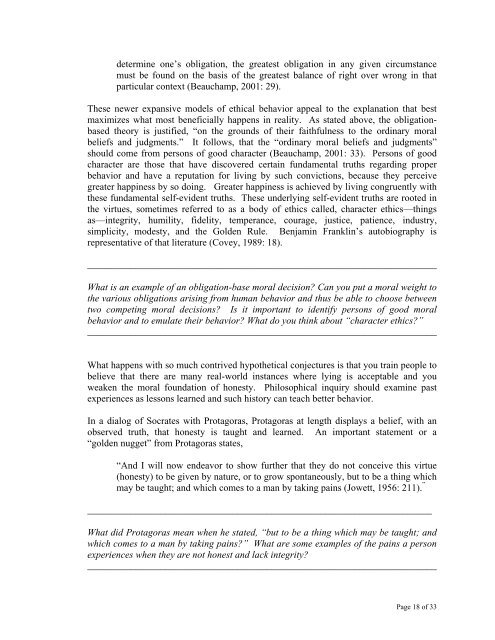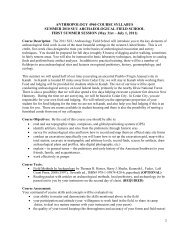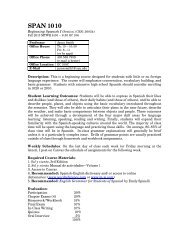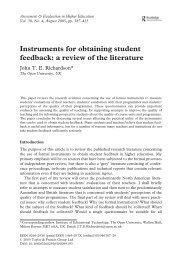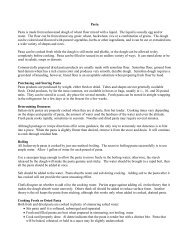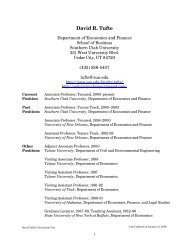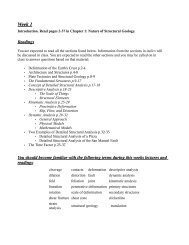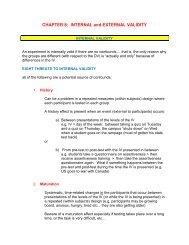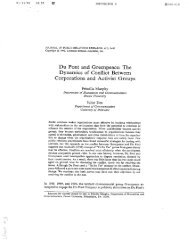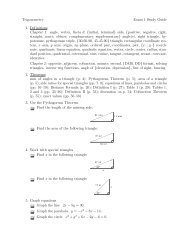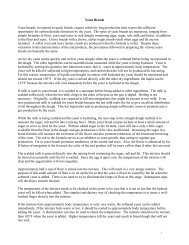Jeffrey Barnes: Self-Evident Truths - Southern Utah University
Jeffrey Barnes: Self-Evident Truths - Southern Utah University
Jeffrey Barnes: Self-Evident Truths - Southern Utah University
Create successful ePaper yourself
Turn your PDF publications into a flip-book with our unique Google optimized e-Paper software.
determine one’s obligation, the greatest obligation in any given circumstance<br />
must be found on the basis of the greatest balance of right over wrong in that<br />
particular context (Beauchamp, 2001: 29).<br />
These newer expansive models of ethical behavior appeal to the explanation that best<br />
maximizes what most beneficially happens in reality. As stated above, the obligationbased<br />
theory is justified, “on the grounds of their faithfulness to the ordinary moral<br />
beliefs and judgments.” It follows, that the “ordinary moral beliefs and judgments”<br />
should come from persons of good character (Beauchamp, 2001: 33). Persons of good<br />
character are those that have discovered certain fundamental truths regarding proper<br />
behavior and have a reputation for living by such convictions, because they perceive<br />
greater happiness by so doing. Greater happiness is achieved by living congruently with<br />
these fundamental self-evident truths. These underlying self-evident truths are rooted in<br />
the virtues, sometimes referred to as a body of ethics called, character ethics—things<br />
as—integrity, humility, fidelity, temperance, courage, justice, patience, industry,<br />
simplicity, modesty, and the Golden Rule. Benjamin Franklin’s autobiography is<br />
representative of that literature (Covey, 1989: 18).<br />
________________________________________________________________________<br />
What is an example of an obligation-base moral decision? Can you put a moral weight to<br />
the various obligations arising from human behavior and thus be able to choose between<br />
two competing moral decisions? Is it important to identify persons of good moral<br />
behavior and to emulate their behavior? What do you think about “character ethics?”<br />
________________________________________________________________________<br />
What happens with so much contrived hypothetical conjectures is that you train people to<br />
believe that there are many real-world instances where lying is acceptable and you<br />
weaken the moral foundation of honesty. Philosophical inquiry should examine past<br />
experiences as lessons learned and such history can teach better behavior.<br />
In a dialog of Socrates with Protagoras, Protagoras at length displays a belief, with an<br />
observed truth, that honesty is taught and learned. An important statement or a<br />
“golden nugget” from Protagoras states,<br />
“And I will now endeavor to show further that they do not conceive this virtue<br />
(honesty) to be given by nature, or to grow spontaneously, but to be a thing which<br />
may be taught; and which comes to a man by taking pains (Jowett, 1956: 211). ”<br />
_______________________________________________________________________<br />
What did Protagoras mean when he stated, “but to be a thing which may be taught; and<br />
which comes to a man by taking pains?” What are some examples of the pains a person<br />
experiences when they are not honest and lack integrity?<br />
________________________________________________________________________<br />
Page 18 of 33


